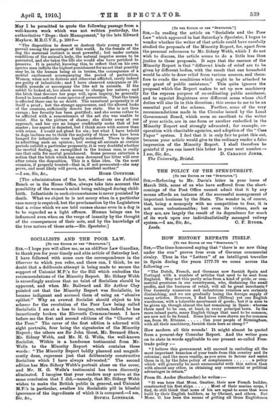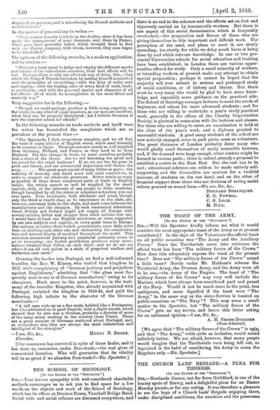HOW HISTORY REPEATS ITSELF.
CrO THE EDITOZ OP THE " SPEETATOR."1 SIR,—The time-honoured saying that "there is no new thing under the sun" proves true even of German commercial rivalry. Thus in the "Letters" of an intelligent traveller in Spain during the years 1777-78 we come across the following :— "The Dutch, French, and Germans now furnish Spain and Portugal with a number of articles that used to be sent from England. May not this partly arise from a kind of pride, or com- mercial greatness in our countrymen, who, disdaining the small profits, and the business of retail, will all be great merchants ? Our formerly numerous and industrious retailers are certainly diminishing, and we are gradually losing the foreign supply of many articles. However, I find here (Bilboa) yet one English warehouse, with a tolerable assortment of goods ; but it is soon to be given up, though almost the last remaining in Spain : whereas there used to be one, at least, in every principal town. In the more inland parts, many English things that used to be common, are now not to be found. Some knives were shewn me for common
use, from St. Etienne Can your people of Birmingham, with all their machinery, furnish them here so cheap ? "
How modern all this sounds ! It might almost be quoted from a present-day Consular Report. And the writer goes on to state in words applicable to our present so-called Free- trade policy :—
" I believe this government will succeed in excluding all the most important branches of your trade from this country and its colonies ; and the more readily, as you seem to favour and assist them in it, by the false policy of complaisance a policy which will generally be more unsuccessful with this nation than with almost any other, in obtaining any commercial or political advantages in return."
From St. Ander (Santander) he writes :—
" It was here that Mons. Gautier, their new French builder,
constructed his first ships Most of their marine corps, I find, do still think that none of his are equal to some that were built by their English builders, as by Obriant, and others. But Mons. G. has been the means of getting all those Englishmen displaced, on pensions, and is introducing the French methods and establishments."
In the matter of gun-making be writes :— " Their cannon foundry is lately on the decline, since it has been under the management of some Germans sent them by France. Their guns have generally failed, which brought them to deal with our Carron company, with whom, however, they soon began to be dissatisfied."
The aptness of the following remarks, in a modern application, will be obvious :— "Without a head equal to judge and employ the different merits and talents of the subordinate members, their best effects will be lost. Perhaps there is only one effectual way of doing this,—that which the King of Prussia has taken, by making himself acquainted with the principles of everything,—with the duty of every rank and employ,—with the leading rules of every kind of work, trade, or profession,—and with the personal merits and character of all his officers : all of which he accomplishes in the most direct and masterly way."
Very suggestive too is the following:
"Though we could perhaps produce a little army, superior, on the whole, to any other of equal numbers, as our men are excellent, when they can be properly disciplined : yet I believe Germany is now the superior school for officers."
In the following remarks on trade methods and tariff wars the writer has forestalled the complaints which are so prevalent at the present time :—
" The Spaniards, I find, everywhere complain, and we all feel, the want of many articles of English wares, which used formerly to be common in Spain. These are not now nearly so well supplied from Germany, Holland, and France, as they used to be from England. For this change in trade, we must ourselves probably bear a share of the blame. Are we not becoming too great and too proud for the retail business ? If so, we are too far gone in pride and luxury, and our commercial importance will thence die Away The great must consist of many littles or parts : the industry of economy and detail must still exist somewhere, in order to support our wholesale greatness. Better retain as many as possible of those lesser component parts of trade in English hands : the retails cannot so well be supplied by the small capitals, skill, or the interests of any people in these countries, though furnished by all the riders or commission-hunters you can ever spare. Your merchants, both wholesale and retail, though only the third or fourth class as to importance in the state, are, however, necessary links in this chain, and must come between the manufacturer and the stranger. By such economical attentions, Great Britain and Ireland might yet supply all Europe with several articles, better and cheaper than other nations ever can. I would have at least one English warehouse, or store, supported by our own subjects and capitals, in every great town in Europe. But nations, or rather their foolish governments, seem daily more bent on shutting each other out, and obstructing the communica- tion and natural liberty of mankind throughout the world. This mistaken commercial jealousy and unnatural .miniosity seems to go on increasing : one foolish prohibition produces ninny more : nations retaliate their follies on each other: and we do not see where it can all end, unless in a state of perpetual warfare and barbarism once more."
Crossing the border into Portugal, we find a well-informed traveller, the Rev. W. Kinsey, who visited that, kingdom in 1827, while complaining of "German jealousy and prejudices against Englishmen," admitting that "the glass most fre- quently seen in use is of German manufacture," owing to its cheapness. Much more to the point, however, is the testi- mony of the traveller Kingston, who, already acquainted with Portugal, revisited the kingdom in 1843-44, and paid the
following high tribute to the character of the German merchants :—
"A tall man rode np on a fine mule, habited like a Portugneee, but who addressed us in good English, with a slight accent, which showed that he also was a German, probably a director of some of the many mines working in the country (near Yiseu). There are a great number of Germans scattered about Portugal, and, as everywhere else, they are always the most industrious and intelligent of the strangers."
Clevecton.
[Our commerce has survived in spite of these faults, and it has done so, remember, under Free-trade,—the real giver of commercial bounties. Who will guarantee that its vitality will be as great if we abandon Free-trade P—En. Spectator.]











































 Previous page
Previous page